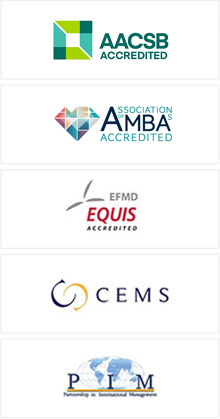Specialisation areas
The content and focus of the Master's Programme in Information and Service Management differs according to its three elective areas of specialisation:
Business Analytics, Information Systems and Logistics and Service Management. Below you can read more about the specialisation areas with examples of popular courses and their short descriptions to give a better view what you could be studying.
Business Analytics
Business analytics is the practice of iterative, methodical exploration of an organization’s data with an emphasis on statistical analysis. It focuses on developing new insights and understanding of business performance based on data and statistical methods.
Our program trains students to manage and analyse the rapidly growing volume and variety of data available to be utilised for different fields of business, technology and competitive intelligence. The aim is to solve practical business problems by effectively utilising modern managerial tools ranging from quantitative models, information and communication technologies (ICT) to various techniques for analyzing big, open, and company-owned data.
Business professionals who are experienced in Business Analytics are in high demand as organizations are looking for ways to exploit the power of Big Data. The demand grows constantly as a number of organizations implementing analytics are increasing and thereby looking for professionals in this area. Below you can see examples of popular courses and their short descriptions to give a better view what you could be studying in Business Analytics.
Data Science for Business
"Students who complete this course will recognize how different data science methods can support business decision-making. Students also identify the role of data as a business asset and are able to approach business problems data-analytically. Topics include basics of predictive modeling, shopping-basket analysis, market segmentation, classification, evaluation of models, expected value framework, problem of over-fitting and its avoidance. Application examples range from targeted online advertising to churn modeling and profiling of customer segments. You will also learn to use tools like SPSS Modeler and R."
Business Decisions 2
"This course focuses on models for supporting decision making under uncertainty, risk and multiple objectives. After the course the student can recognize the types of real-life business problems where use of the models brings added value, interpret results of these models to derive defensible decision recommendations, and build and solve these models using spreadsheets to support business decision making."
Database Marketing
"After completing the course students are able to utilize the customer oriented business potential as well customer databases and wen analytics. They know approaches to support decision making with customer data analyses and can identify the correct tools to aid in different situations. Course topics include database development in the marketing process and the essential tools for analysis, e.g. segmentation, database scoring, and lifetime value of customer."
Information Systems
The focus of Information Systems is on managing and developing business processes using information systems and networks. Topics include business information systems, e-commerce and software business as well as their strategic applications. The aim is efficient management of information resources and the skilful implementation of information systems applying technology which best supports the particular business needs.
Opportunities for information systems graduates can be found at any organisation that makes use of ICT facilities, meaning the variety of potential employers is vast. Information systems majors have also some of the highest starting salaries of all business majors according to both Finnish and international studies. The programme of Information Systems provides students with an appreciated and diverse skillset and so can future positions vary from project manager to consultant or business analyst. Below you can see examples of popular courses and their short descriptions to give a better view what you could be studying in Information Systems.
Business Intelligence
"After completing the course students will have both analytical problem solving and data management skills that enable them to work with the data and to turn it into intelligent reporting for particular decisional contexts. The course seeks shed light on the key building blocks of BI, such as data management, data warehousing, analytic tools, data mining, and reporting. The course provides both a hands-on practical and a theoretical approach to learning about data driven decision-making and analytical problem solving."
ICT Enabled Business Process Development
"This course gives students the possibility to understand the possibilities of IT to support and enhance the business processes of enterprises and other organizations. Students will learn the basic skills needed in IT enabled business process development projects. The main topics of the course include E-Business from process improvement perspective and management of IT enabled business process improvement projects."
Strategic Information Technology Management
"Students who complete this course will become familiar with IT management in key IT decisions and processes such as organizing the IT function, managing IT Services, IT sourcing and outsourcing, enterprise and IT architecture management, IT portfolio management, IT risk management, the business value of IT, and IT performance management. They will also learn how IT enabled innovations and emerging technologies are managed as a part of enterprise strategic management."
Logistics and Service Management
The focus of Logistics and Service Management is on providing students with the capabilities to manage and develop companies’ production, distribution, supply, purchasing and service operations. Topics include supply chain management in various operating environments, service development and operations, inventory management models and policies, quality management and different business models. This focus area prepares students for the challenges of the network economy and gives the ability to control and design complex logistics chains and to apply project management skills to various environments. Students will learn project management, as well as coordinating and overseeing a process to its completion.
Careers in logistics and service management are expected to grow faster than normal over the next 10 years. Outsourcing has provided new challenges and new opportunities in logistics and the move of individual markets shifting to a global economy is the reason why the number of jobs in logistics and service management are growing. Jobs in the field of logistics and service management include logistics manager, integrated programs director, supply chain director, inventory manager, project manager and many others. Below you can see popular courses and their short descriptions to give a better view what you could be studying in Logistics and Service Management.
Product and Inventory Management
"The course provides an integrated methodology for strategy based inventory and product management in supply chains. Students learn to analytically solve problems and make decision considering forecasting, inventory planning and service levels, profitability, product range, supply chain dynamics, facility location, distribution, and routing."
Service Operations and Strategy
"The objectives of the course include the development of a systems-based understanding of service systems, and the understanding of process analysis and productivity. The student learns how to match the needs of customer with the appropriate service process and delivery channel. Student will learn the tools, techniques and strategies necessary to improve operations performance in the service industries. The topics covered include: role of customers in service processes, design of sustainable service models, service delivery channels, service classifications and service supply chains."
Service Business Models
"Students completing this course will learn in-depth understanding of managing a software or service product development and launch, as well as, the management and business models connected to services and products. The course discusses the lifecycle of a software venture, including product idea, founding a company, and acquiring risk financing. Furthermore, the focus is on recognizing, analyzing and choosing the alternative business models for the product or service, with a special emphasis on digital goods and bundles consisting of software and connected services."




